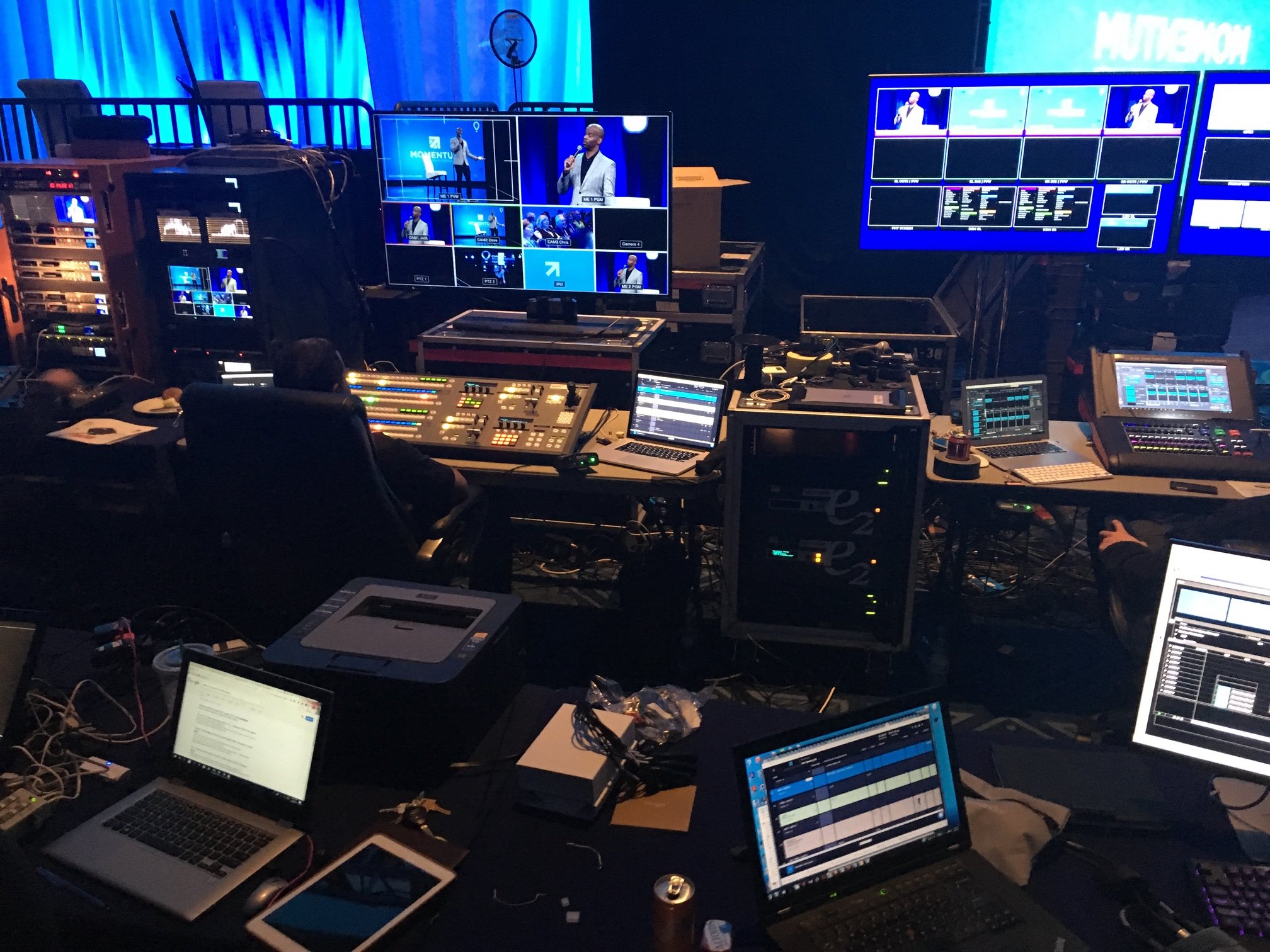Exactly How Event Production Functions: A Comprehensive Check Out the Refine
Event production is a complicated and organized procedure that needs careful planning and execution. It begins with establishing clear purposes and recognizing the target market. Each step, from budgeting to venue selection, plays a crucial function in making sure success. As the process unfolds, numerous aspects should align seamlessly. The subtleties of this complex operation frequently go undetected. What are the crucial phases that contribute to a memorable event?

The Preliminary Planning Stage
When beginning on event production, cautious planning is necessary to assure an effective end result. The initial planning phase serves as the foundation for all subsequent efforts. During this phase, event producers must define the event's objective and goals clearly. Determining the target market assists tailor the experience and messaging, guaranteeing relevance and engagement.Producers have to likewise consider the event format, whether it be in-person, online, or crossbreed, as this will influence different logistical elements. Picking an appropriate date and place is crucial, as it impacts ease of access and availability.Furthermore, putting together a trusted group is essential for dividing responsibilities and simplifying interaction. Establishing a timeline with milestones guarantees all tasks are finished on timetable. This stage involves thorough study, consisting of identifying possible challenges and devising approaches to alleviate risks. Inevitably, a well-structured preliminary planning stage sets the tone for an effective event production trip.

Budgeting and Resource Appropriation
In event production, efficient budgeting and source allotment are critical for success - event production charlotte. Developing economic specifications establishes the foundation for all succeeding decisions, while resource circulation approaches guarantee that every component of the event is appropriately supported. With each other, these elements aid maintain control over expenditures and maximize using readily available resources
Developing Financial Parameters
Developing financial specifications is essential to the success of any event production, as it establishes the foundation for efficient budgeting and source allotment. This procedure starts with specifying the overall budget plan, which incorporates all aspects of the event, including place costs, food catering, and marketing. By identifying offered funds, event coordinators can focus on expenses and allocate resources appropriately. Additionally, it is important to carry out complete marketing research to anticipate potential costs and determine funding resources, such as sponsorships or ticket sales. Developing clear economic criteria additionally help in threat management, allowing coordinators to reserve backup funds for unexpected expenses. Ultimately, a well-defined budget functions as a roadmap, guiding the event production team towards accomplishing their objectives while preserving monetary control.
Resource Distribution Strategies
Effective resource distribution strategies are important for making the most of the impact of an event while adhering to spending plan restraints. Effective event production needs a careful technique to budgeting and resource allotment. Planners must focus on necessary aspects such as venue, catering, and technology, ensuring that funds are allocated to locations that improve attendee experience. A detailed spending plan must describe anticipated expenditures and determine areas for possible expense savings, such as bargaining with vendors or exploring sponsorship possibilities. Furthermore, tracking expenditures throughout the planning process helps protect against overspending. By utilizing strategic source distribution, event manufacturers can deliver a remarkable experience while preserving monetary obligation, inevitably adding to the overall success of the event.
Place Option and Logistics
Selecting the ideal place is important to the success of any type of event, as it establishes the phase for the general experience. Venue option includes reviewing different factors, including capacity, availability, and location. Coordinators must think about the target market and the nature of the event, making certain the place aligns with the event's goals.Logistics play a considerable duty in this procedure, involving plans for seats, audiovisual tools, and providing solutions. A well-chosen venue must promote smooth flow for attendees and personnel, improving engagement.Additionally, assessing potential venues for features like car parking, bathrooms, and fire escape is important for security and benefit. The timeline for protecting the location is additionally critical, as popular locations may book rapidly - event production charlotte. Comprehensive planning and timely execution can ultimately add to a smooth event experience, making place choice and logistics essential elements of successful event production.
Creative Concept Development
While the venue establishes the physical phase, innovative idea development shapes the event's identification and story. This procedure starts with determining the event's purpose and target market, permitting event producers to formulate an engaging motif that reverberates with participants. Conceptualizing sessions frequently consist of varied viewpoints, cultivating ingenious concepts that line up with the event's goals.Once a style is developed, visual components such as color palettes, signs, and design are developed to enhance the total environment. Narration methods may additionally be integrated to create an interesting journey for individuals, ensuring a memorable experience. In addition, considerations regarding amusement, activities, and interactive parts are lined up with the chosen principle, reinforcing the motif throughout the event.Ultimately, effective imaginative concept growth guarantees that every element of the event works cohesively, leaving an enduring impression on guests and fulfilling the event's goals. This fundamental work lays the foundation for succeeding planning and execution phases.
Teaming up With Suppliers and Suppliers
Effective event production depends upon effective partnership with suppliers and suppliers. Choosing reputable companions, bargaining agreements successfully, and making certain timely distributions are crucial steps in this procedure. Each of these factors contributes considerably to the total success and smooth execution of an event.
Choosing Reliable Allies
Just how can event organizers guarantee a seamless production experience? Choosing trusted partners is important in accomplishing this objective. Event organizers need to perform thorough research to identify vendors and providers with a tested performance history of quality. This consists of inspecting referrals, assessing profiles, and reviewing consumer responses. Organizers should focus on companions that show professionalism and reliability, timely communication, and a determination to work together. Building strong relationships fosters trust and enables fast analytic throughout the event. In addition, it is valuable to pick regional vendors who understand the place and local logistics. Eventually, a successful event hinges on the synergy in between planners and their partners, ensuring that every aspect of production runs smoothly and effectively.
Discussing Contracts Successfully
Effective negotiation of agreements is an important action in the collaboration between event organizers and their vendors and providers. This procedure includes clear communication of assumptions, deliverables, and timelines. Coordinators should perform complete study on market prices and industry criteria to establish a standard for settlements. It is essential to develop a collective ambience, motivating open dialogue about terms, prices, and prospective backups. Planners need to likewise focus on understanding the vendor's capacities and restrictions to straighten their needs properly. Versatility can bring about mutually valuable agreements, cultivating lasting connections. Crafting well-defined contracts that include particular efficiency metrics can help assure accountability, inevitably resulting in effective event implementation and fulfillment for all celebrations involved.
Making Sure Prompt Deliveries
Prompt distributions are vital for the smooth implementation of any kind of event, requiring persistent cooperation in between planners and their vendors and distributors. Effective communication is important, as it assists develop clear assumptions regarding delivery schedules, quantities, and certain demands. Organizers frequently produce thorough timelines to outline crucial turning points, guaranteeing all celebrations stay lined up throughout the process. Regular check-ins with vendors can help identify potential delays early, allowing for proactive solutions. Additionally, building strong relationships with dependable providers fosters trust and accountability, which can cause far better solution and go to this website prioritization. By prioritizing these collaborative efforts, planners can minimize disturbances, therefore boosting the general effectiveness of event production and guaranteeing that all necessary products and solutions show up as prepared.
Advertising and Promotion Approaches
While arranging an event, the success of you could try this out advertising and marketing and promotion strategies can substantially affect attendance and involvement. Efficient strategies usually include a mix of digital advertising and marketing, conventional advertising and marketing, and grassroots outreach. Making use of social networks systems permits real-time communication and targeted advertising, getting to specific demographics successfully. Email marketing campaigns can better involve potential guests with tailored content and reminders.Collaborations with influencers or market leaders can also improve reliability and broaden reach. Developing engaging web content, such as videos or blogs, assists to create buzz and suffer passion leading up to the event. Additionally, leveraging early-bird discount rates and special rewards can incentivize ticket purchases.Promoting through standard channels, such as posters or regional media, continues to be relevant, especially in community-focused events. A detailed approach that integrates several methods warranties maximum exposure and involvement, inevitably adding to the event's success and the creation of a memorable experience for guests.
On-Site Implementation and Administration
On-site implementation and monitoring are essential components that identify the general success of an event. Effective sychronisation during the event ensures that all aspects line up with the prepared program. Event managers oversee logistics, including vendor sychronisation, devices configuration, and visitor solutions. Keeping track of timelines and attending to any type Continue of unanticipated problems are basic for preserving a seamless experience.The staff plays a considerable role, as trained employees are in charge of numerous tasks such as registration, info dissemination, and technological support. Communication among group members is critical; it fosters a collective atmosphere and allows fast resolution of challenges.Additionally, safety and security procedures have to be complied with, guarding the wellness of all attendees. Post-event evaluations are additionally part of on-site monitoring, supplying insights for future enhancements. By concentrating on these elements, event producers can develop unforgettable experiences that meet or surpass attendee assumptions while achieving the event's purposes.
Frequently Asked Inquiries
Exactly how Do I Choose the Right Event Motif?
Choosing the ideal event theme entails considering the target market, event purpose, and location. Looking into existing patterns and collecting input from stakeholders can also motivate creative ideas that reverberate and create an unforgettable experience.

What Prevail Errors in Event Production?
Common mistakes in event production often consist of poor planning, poor interaction amongst employee, budget plan mismanagement, overlooking to take into account the target market's requirements, and failing to perform a comprehensive post-event evaluation for future renovations.
Exactly How Can I Determine Event Success?
To determine event success, one can analyze participant complete satisfaction, involvement levels, spending plan adherence, and post-event comments. Trick performance indications, such as ticket sales and social media interactions, likewise offer important insights into total performance.
What Should I Do if It Rains on the Event Day?
In the event of rainfall on the day, the coordinator needs to apply backup plans, such as safeguarding camping tents or relocating activities inside. Communication with attendees regarding adjustments is important to ensure a smooth experience regardless of weather condition obstacles.
How Can I Make Certain Attendee Interaction Throughout the Event?
